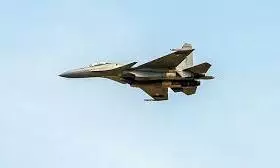
India launches major military exercises near Pakistan border amid rising tensions
text_fieldsThe Indian Air Force is set to conduct significant military drills along the international border with Pakistan, signaling heightened military readiness following last month’s terror attack in Jammu and Kashmir’s Pahalgam.
A Notice to Airmen (NOTAM) was issued on Tuesday evening, announcing that the drills will begin at 9 PM on Wednesday and conclude by 3 AM Friday. During this time, air traffic in and out of airports near the border will be suspended.
These war games come in the wake of growing tensions between India and Pakistan, particularly after the Pahalgam terror attack, which claimed 26 lives, most of them civilians. India has blamed the Pakistan-based terror outfit Lashkar-e-Taiba and its proxy, The Resistance Front, for orchestrating the deadly assault, and has accused Pakistan of direct involvement.
In parallel with the Air Force exercises, civil defence drills are being conducted across nearly 300 locations in India, including Delhi. These drills are designed to test and strengthen the civilian response mechanism in the event of hostile military activity. This is the first large-scale civil defence operation of its kind since the 1971 India-Pakistan war.
Civil defence districts are identified by the presence of key military or public infrastructure, such as oil refineries or nuclear facilities, and are thus considered potential targets in conflict scenarios.
The military preparations follow a series of high-level meetings chaired by Prime Minister Narendra Modi, including discussions with National Security Advisor Ajit Doval, Defence Minister Rajnath Singh, Chief of Defence Staff General Anil Chauhan, and the chiefs of the Army, Navy, and Air Force.
Sources say that during one of these meetings, the Prime Minister gave the armed forces "full freedom" to plan and execute a suitable response to the Pahalgam attack.
Amidst this, both India and Pakistan have conducted missile tests in a show of strategic posturing.
Pakistan test-fired the Fatah missile, a domestically produced surface-to-surface missile with a 120 km range, as part of Exercise INDUS—a name that appears to allude to ongoing tensions over the Indus Waters Treaty (IWT).
India, meanwhile, tested an advanced underwater mine equipped with cutting-edge sensors that can detect acoustic, magnetic, and pressure signatures of enemy vessels.
India had earlier revoked visas for Pakistani nationals and suspended the 1960 Indus Waters Treaty, significantly impacting water flow to Pakistan’s agricultural heartlands. In retaliation, Pakistan suspended visas for Indian nationals and declared the 1972 Simla Agreement null.
Prime Minister Modi has vowed that "evil will never succeed", promising to bring justice not only to the terrorists responsible for the Pahalgam killings but also to those who orchestrated and supported them from across the border.












